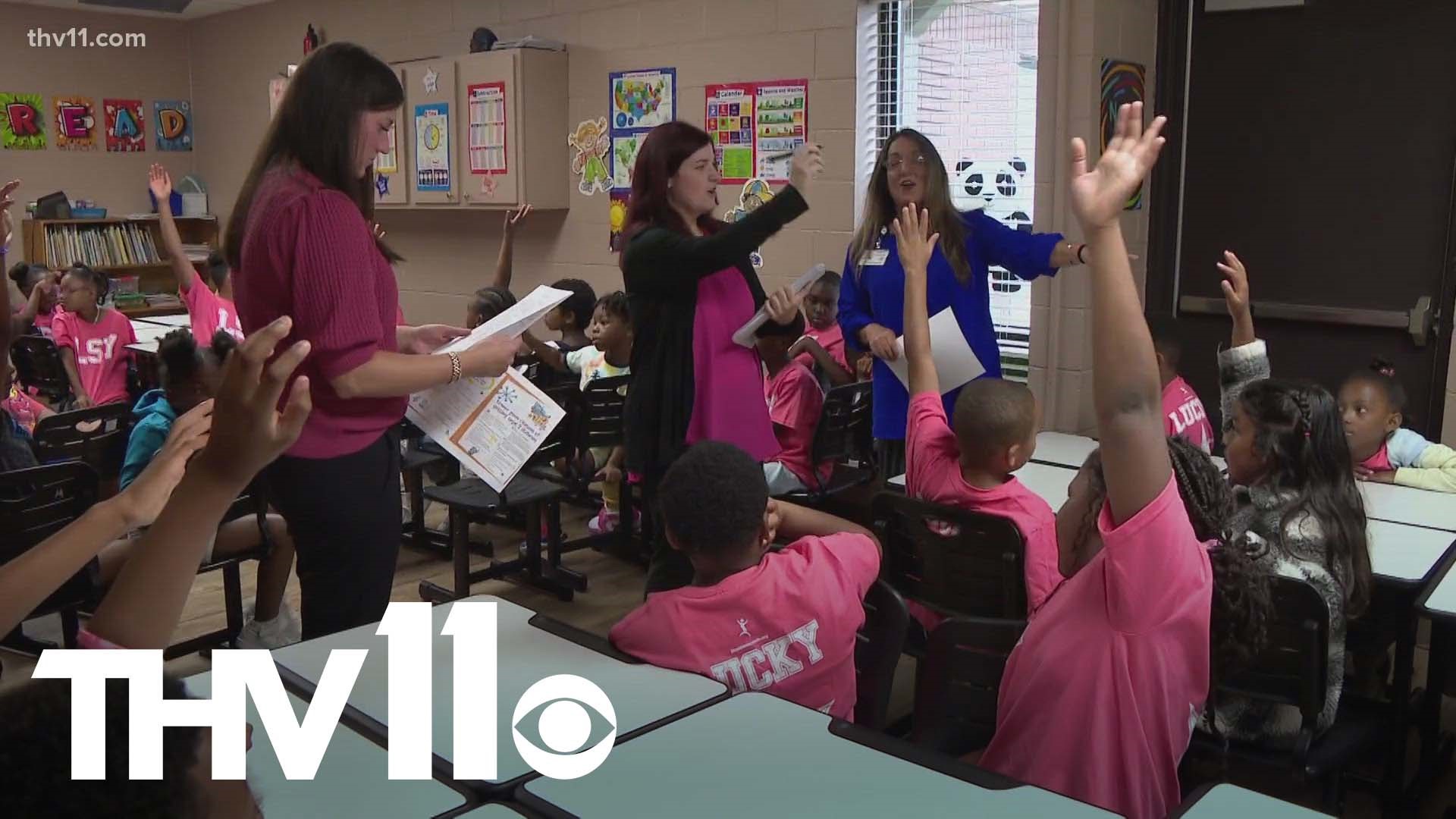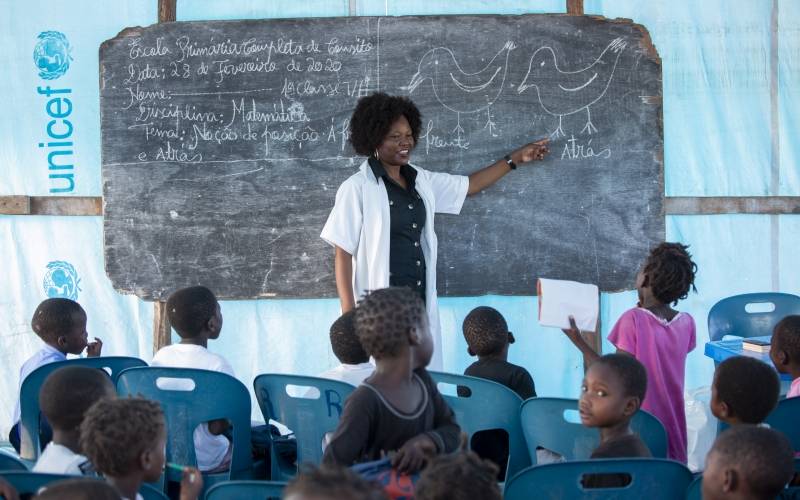Early childhood education programs provide comprehensive and enriching learning experiences for young children. These programs focus on nurturing the physical, social, emotional, and cognitive development of children aged 3-5 years, preparing them for future academic success.
With a strong emphasis on play-based learning, these programs create a supportive and stimulating environment where children can explore their interests, develop their creativity, and build critical skills. Through engaging activities, skilled educators foster children’s curiosity and love for learning, helping them acquire foundational knowledge in a fun and interactive manner.
Early childhood education programs also promote socialization, teamwork, and the development of important life skills, ensuring that children are well-prepared for their educational journey ahead.

Credit: www.thv11.com
The Importance Of Early Childhood Education Programs
Early childhood education programs have a profound impact on future success. These programs play a pivotal role in cognitive and social development, providing a solid foundation for children. They equip young minds with essential skills and knowledge necessary for their educational journey.
Through interactive activities and engaging lessons, children learn to think critically and problem-solve. Moreover, they develop important social skills such as communication, teamwork, and empathy. Quality early education programs foster a love for learning and curiosity, igniting a lifelong passion for knowledge.
Additionally, these programs support children in developing their creativity and imagination. By investing in early childhood education, we set children on a path towards a brighter future, unlocking their full potential and ensuring their success in later stages of life.
Key Components Of Successful Early Childhood Education Programs
Successful early childhood education programs consist of key components such as well-designed curriculum and highly qualified educators. These programs emphasize the importance of curriculum design and development, ensuring that children receive a holistic education. Trained educators play a crucial role in providing high-quality instruction and guidance in a nurturing environment.
Parental involvement and support are also integral to the success of these programs. When parents actively participate in their child’s education, it fosters a strong partnership between home and school. This collaboration enhances the child’s learning experience and promotes their overall development.
Strong early childhood education programs recognize the value of these components and strive to create a comprehensive educational experience for young children. By prioritizing these key aspects, these programs set a solid foundation for children’s future academic and personal success.
Pre-K Programs
Pre-k programs are designed to provide early childhood education to children before they enter kindergarten. These programs offer a range of benefits, including promoting social and emotional development, improving school readiness, and enhancing cognitive skills. By enrolling your child in a pre-k program, they can develop important skills such as language, math, and problem-solving abilities in a supportive and structured environment.
When choosing the right pre-k program for your child, consider factors like the curriculum, teaching methods, class size, and teacher qualifications. Look for programs that align with your child’s interests, learning style, and developmental needs. Research, visit different programs, and ask questions to ensure you find a program that will provide the best educational experience for your child.
By choosing the right pre-k program, you can set your child on a path towards success in their academic journey.
Montessori Education
Montessori education is a unique approach to early childhood education that emphasizes independence and self-directed learning. The philosophy and principles of montessori education promote a hands-on, experiential learning environment where children can explore and discover at their own pace. In the montessori classroom, students have access to a wide range of materials and learning activities that are specifically designed to promote engagement and foster the development of key skills and knowledge.
From practical life activities to sensorial exploration, montessori materials are carefully selected to support the holistic growth and development of each child. By providing a nurturing and stimulating environment, montessori education aims to cultivate a lifelong love of learning, as well as the essential social, emotional, and cognitive foundations that are crucial for future success.
Reggio Emilia Approach
Reggio emilia approach, a prominent philosophy in early childhood education, emphasizes key principles. This approach values collaborative learning and project-based curriculum. By focusing on the child’s interests, teachers provide a nurturing environment for exploration. Children are seen as capable and competent, with their unique perspectives shaping the learning process.
Educators value the role of documentation in capturing and reflecting the child’s progress and achievements. The reggio emilia approach also emphasizes the importance of strong parent-teacher partnerships, encouraging families to actively participate in their child’s education. With its emphasis on creativity, critical thinking, and problem-solving, this approach fosters a love for learning, equipping children with essential skills for their future endeavors.
Overall, the reggio emilia approach champions a child-centered approach to education, nurturing their natural curiosity and fostering their holistic development.
Technology Integration
Technology integration in early childhood education programs has both benefits and risks. Incorporating technology in the classroom helps children develop technological skills from a young age. Examples of technology integration include using interactive learning apps and educational games. It also enhances engagement and interactivity during lessons.
However, there are risks, such as overexposure to screens and potential distractions. To ensure best practices, educators should follow guidelines for using technology in the classroom. This includes incorporating technology in a balanced and age-appropriate manner, setting limits, and providing supervision.
By implementing technology effectively, early childhood education programs can optimize learning experiences for young learners.
Multicultural Education
Multicultural education is of crucial importance in early childhood education programs. It fosters cultural diversity, allowing children to develop an appreciation for different backgrounds. To promote multicultural education, various effective strategies can be implemented. These include incorporating diverse literature and materials into curricula, incorporating celebrations of different cultures, and encouraging open discussions about cultural differences.
Furthermore, there are numerous examples of multicultural education programs. For instance, some schools offer dual language immersion programs, where children learn subjects in both their native language and a second language. Other programs focus on integrating cultural experiences, such as field trips to museums and cultural centers.
These initiatives not only enhance cultural understanding but also promote tolerance, respect, and acceptance among children from diverse backgrounds. Overall, multicultural education plays a pivotal role in early childhood education, shaping children into global citizens who embrace diversity in our interconnected world.
Nature-Based Education
Incorporating outdoor learning activities in early education can have numerous benefits for children’s development. Nature-based education programs around the world are recognizing the importance of connecting children with nature. When children engage with the natural environment, they have the opportunity to enhance their sensory and motor skills.
They learn to appreciate and respect the natural world, fostering a sense of environmental responsibility from an early age. Additionally, being outdoors promotes physical activity and engagement in creative and imaginative play, which is crucial for cognitive development. Nature-based education programs also emphasize the importance of hands-on experiences, allowing children to explore and discover the wonders of nature firsthand.
By connecting children with nature, early childhood education programs can provide a holistic learning experience that nurtures their overall development.
Frequently Asked Questions Of Early Childhood Education Programs
What Are The Benefits Of Early Childhood Education Programs?
Early childhood education programs provide numerous benefits such as fostering social and emotional development, enhancing cognitive skills, preparing children for academic success, and promoting lifelong learning habits.
How Do Early Childhood Education Programs Promote Social Development?
Early childhood education programs promote social development by providing opportunities for children to interact with their peers, develop communication skills, learn how to share and take turns, and cultivate empathy and cooperation.
What Qualifications Do Teachers In Early Childhood Education Programs Need?
Teachers in early childhood education programs typically need a minimum of a bachelor’s degree in early childhood education or a related field, as well as relevant certifications and experience working with young children.
How Do Early Childhood Education Programs Support Language Development?
Early childhood education programs support language development through activities such as storytelling, reading aloud, singing songs, engaging in conversations, and providing a language-rich environment that exposes children to vocabulary and linguistic patterns.
How Can Parents Be Involved In Early Childhood Education Programs?
Parents can be involved in early childhood education programs by participating in parent-teacher conferences, volunteering in the classroom, attending school events and workshops, and engaging in activities that support their child’s learning at home.
What Is The Ideal Age To Enroll A Child In An Early Childhood Education Program?
The ideal age to enroll a child in an early childhood education program is typically between 2 to 5 years old, as this is a crucial period for brain development and learning foundational skills that set the stage for future academic success.
Conclusion
Early childhood education programs play a crucial role in shaping a child’s future. These programs focus on providing a nurturing environment that fosters the development of essential skills and knowledge. With a strong emphasis on social, emotional, cognitive, and physical development, these programs enable children to reach their full potential.
The benefits of such programs extend beyond the early years, impacting children’s academic achievements and socio-emotional well-being in the long run. Through play-based learning, interactive activities, and experienced educators, early childhood education programs engage children in meaningful experiences that build a solid foundation for lifelong learning.
By instilling a love for learning and social interaction, these programs equip children with the skills necessary for success in school and beyond. Investing in quality early childhood education programs is not only beneficial for children themselves but also for society as a whole, leading to better outcomes for all.





